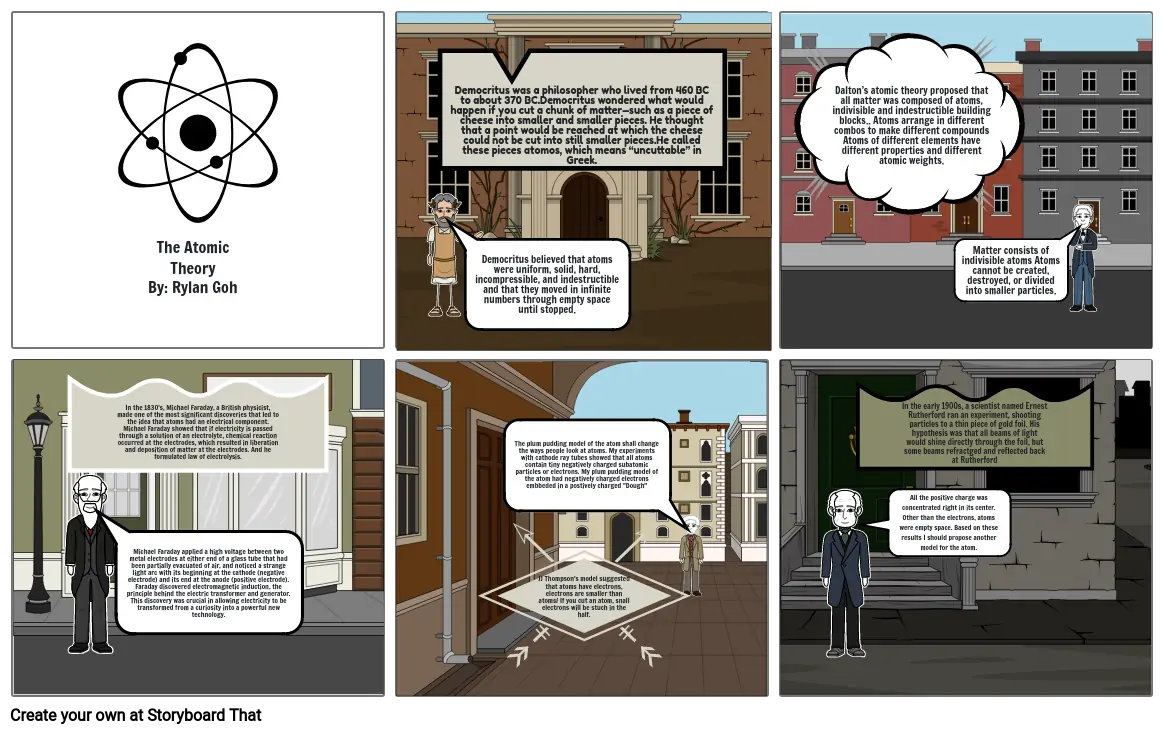Science

स्टोरीबोर्ड पाठ
- The Atomic TheoryBy: Rylan Goh
- Democritus was a philosopher who lived from 460 BC to about 370 BC.Democritus wondered what would happen if you cut a chunk of matter—such as a piece of cheese into smaller and smaller pieces. He thought that a point would be reached at which the cheese could not be cut into still smaller pieces.He called these pieces atomos, which means “uncuttable” in Greek.
- Democritus believed that atoms were uniform, solid, hard, incompressible, and indestructible and that they moved in infinite numbers through empty space until stopped.
- Dalton’s atomic theory proposed that all matter was composed of atoms, indivisible and indestructible building blocks.. Atoms arrange in different combos to make different compounds Atoms of different elements have different properties and different atomic weights.
- Matter consists of indivisible atoms Atoms cannot be created, destroyed, or divided into smaller particles.
- In the 1830's, Michael Faraday, a British physicist, made one of the most significant discoveries that led to the idea that atoms had an electrical component. Michael Faraday showed that if electricity is passed through a solution of an electrolyte, chemical reaction occurred at the electrodes, which resulted in liberation and deposition of matter at the electrodes. And he formulated law of electrolysis.
- Michael Faraday applied a high voltage between two metal electrodes at either end of a glass tube that had been partially evacuated of air, and noticed a strange light arc with its beginning at the cathode (negative electrode) and its end at the anode (positive electrode). Faraday discovered electromagnetic induction, the principle behind the electric transformer and generator. This discovery was crucial in allowing electricity to be transformed from a curiosity into a powerful new technology.
- JJ Thompson's model suggested that atoms have electrons, electrons are smaller than atoms/ If you cut an atom, snall electrons will be stuch in the half.
- The plum pudding model of the atom shall change the ways people look at atoms. My experiments with cathode ray tubes showed that all atoms contain tiny negatively charged subatomic particles or electrons. My plum pudding model of the atom had negatively charged electrons embbeded in a postively charged "Dough"
- All the positive charge was concentrated right in its center. Other than the electrons, atoms were empty space. Based on these results I should propose another model for the atom.
- In the early 1900s, a scientist named Ernest Rutherford ran an experiment, shooting particles to a thin piece of gold foil. His hypothesis was that all beams of light would shine directly through the foil, but some beams refractged and reflected back at Rutherford
30 मिलियन से अधिक स्टोरीबोर्ड बनाए गए

